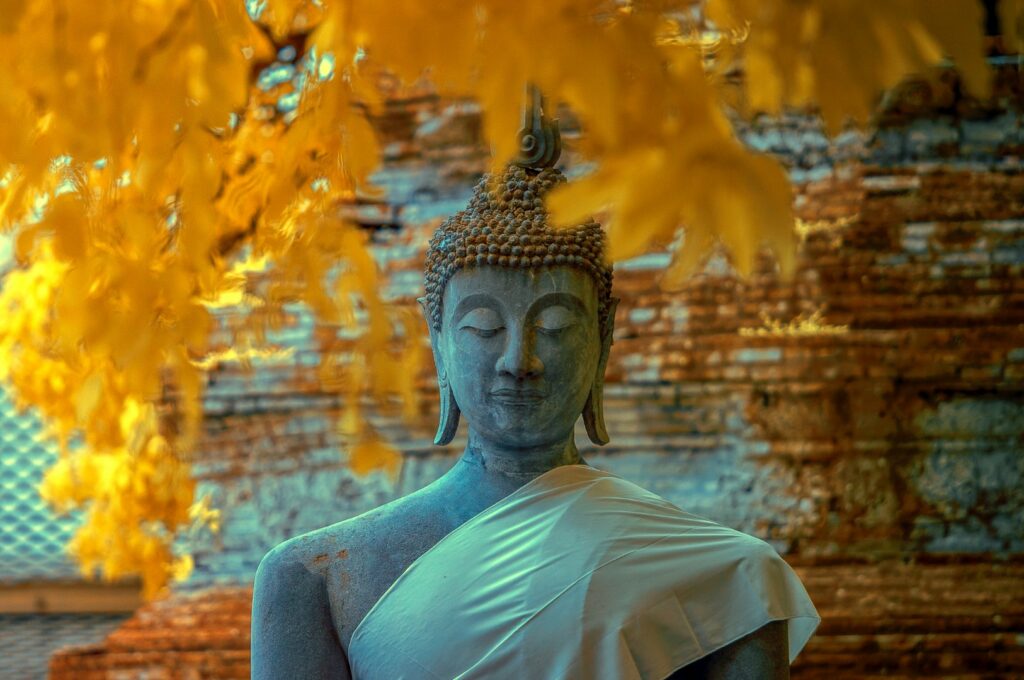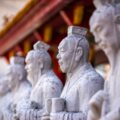Can human rights be justified in Buddhist ethics?
Can human rights be justified in Buddhist ethics?
Human rights are a cornerstone of modern political institutions, but can they be justified in other ethical traditions, such as Buddhism?
This weekly comment was written by Timo Pieters and reflects his personal analyses and opinions, rather than those of EARS.
How human rights are justified in Enlightenment philosophy
Human rights became the cornerstone of many political institutions during the Enlightenment.[1] However, can they be justified in other ethical traditions, such as Buddhism? Before we explore whether human rights can be justified in Buddhist ethics, we have to look at how they were justified in their original Enlightenment context.
The concept of human rights has its roots in the Radical Enlightenment tradition of the 17th and 18th century. Equal human rights were the basis for the egalitarian democratic revolutions in America and Europe, and ultimately led to the liberal democracies that we know today.[2] So how were these rights justified?
The Radical Enlightenment, according to the famous Enlightenment historian Jonathan Israel, originated with the rationalist philosophy of Spinoza, and therefore justified human rights on the basis of reason and nature, rather than on scriptural authority, God, or tradition.[3] This is precisely what made these ideas ‘radical’.
The central idea of this movement was that all human beings have the same basic needs, irrespective of their religious, ethnic, or economic groups, and should therefore be treated equally. In other words, they should be afforded the same basic rights.[4] Humans possess these rights and liberties by nature, which means that these rights are not endowed by society or by the state.[5]
Ways that human rights can be justified in Buddhist ethics
To start with, it is important to point out that the historical Buddha did not speak of human rights at all, because it was simply not part of his vocabulary.[6] However, this does not mean that the concept itself was foreign to him. Some scholars have argued that the Buddhist ethical precepts imply a number of basic rights, because each duty implies a right.[7]
For example, the precept against killing or injuring sentient beings implies that such beings (including animals) have a right to life and physical safety. This is very similar to the liberal ‘non-aggression principle’, which states that no person has the right to harm or coerce anyone else unless this other person is harming or coercing them or someone else.[8]
Another way that human rights can be justified in Buddhism is through the principle of human potential. Buddha claimed that human beings have a unique kind of self-awareness that allows them to cultivate their own minds and behaviour. This is why they can become enlightened, which is the highest goal in human life. One could, therefore, argue that this unique human potential justifies basic rights and liberties, so that people have the opportunity to realise this potential.[9] In other words, human beings have the right to develop themselves, which requires freedom of conscience, religion, speech, and association.
Where Buddhist ethics (seemingly) differs from human rights
Buddhists might argue against the concept of human rights for several reasons. First of all, human rights are based on ‘moral individualism’.[10] It is the individual that has rights rather than a group. This might seem at odds with the Buddhist view of non-self, which states that there is no unchanging, independent self that could own any rights. However, one does not need an unchanging, independent self to have human rights. Buddhist ethics can function perfectly well with a merely changing, conventional self. After all, human rights are a convention that people can uphold without believing that these rights exist absolutely.[11]
Buddhists could also object to the idea of property rights, because non-self implies that there is no such thing as inherent ownership. Property rights could also increase disturbing mental states like greed and jealousy.[12] However, one could also interpret the right to property as the right not to have one’s property seized by someone else. This would be in line with the second moral precept against stealing.[13]
A third objection might be that human rights provide superior moral status to humans, and therefore, disregard the wellbeing of animals. This is a valid objection, because Buddhist moral precepts apply equally to animals as they do to humans.[14] Buddhism would, therefore, object to exclusive human rights, and instead argue for equal rights for all sentient beings.[15]
Buddhist leaders appealing to human rights: Ambedkar and the Burmese uprising
Many contemporary Buddhist leaders and activists have heavily relied upon the concept of human rights in their work. One such activist was B.R. Ambedkar in India. He fought for the equal human rights of the so-called ‘untouchables’ (dalits), which are the lowest caste in Indian society. Ambedkar made sure that discrimination against them was outlawed.[16] He did this partly by invoking the principles of Buddhism, which had always questioned the validity of the caste system in India. Buddha famously re-defined nobility as nobility of character rather than of birth.[17] As a consequence, Buddha taught people of all castes, without discrimination. Ambedkar was so persuasive in his campaigns that untouchables massively started to convert to Buddhism. Most of the 8 million Buddhists in India today are former untouchables.[18]
Another example of Buddhist leaders appealing to human rights is the monk uprisings against the Burmese autocratic regime of the 1980s. In 1988, tens of thousands of students and Buddhist monks filled the streets to demand democracy and human rights.[19] One of the leaders in this struggle, Aung San Suu Kyi, explicitly expressed her belief in Engaged Buddhism, and its connection to democracy and human rights.[20] The protests were non-violent and called for dialogue. The monks had a major influence on the protest movement, because they have traditionally represented the conscience of the country. Without their support, the democratic transition would probably have failed.[21]
The common principle of non-violence
In conclusion, human rights are mostly compatible with Buddhist ethics, even though they emerged from different traditions. In fact, both are based on the common principle of non-violence. The primary aim of modern human rights is to protect individuals against the coercive force of collectives and institutions.[22] Likewise, Buddhist texts portray the ideal society as being devoid of violent coercion. However, they also recognise that government coercion is a necessary evil in a society filled with people trying to harm each other.[23]
This weekly comment was written by Timo Pieters and reflects his personal analyses and opinions, rather than those of EARS.
Interested in similar topics? Go to our Dashboard and receive free updates.
[1] Jonathan Israel, A Revolution of the Mind: Radical Enlightenment and the Intellectual Origins of Modern Democracy (Princeton University Press, 2010), p. vii-viii
[2] Ibid.
[3] Jonathan Israel, Democratic Enlightenment: Philosophy, Revolution, and Human rights 1750-1790 (Oxford University Press, 2011), p. 20-21.
[4] Israel, A Revolution of the Mind, p. viii.
[5] Ibid, p. 102, 186, 237-238.
[6] Sallie B. King, Socially Engaged Buddhism (University of Hawai’i Press, 2009), p. 137.
[7] Perry Schmidt-Leukel. “Buddhism and the Idea of Human Rights.” Studies in Interreligious Dialogue 14, no. 2 (2004): 216–34. P. 222.
[8] Principle of non-aggression – Mises Wiki, the global repository of classical-liberal thought. John Locke wrote in his ‘Second Treatise on Government’: “Being all equal and independent, no one ought to harm another in his life, health, liberty, or possessions.” John Stuart Mill wrote in ‘On Liberty’: “the only purpose for which power can be rightfully exercised over any member of a civilised community, against his will, is to prevent harm to others.”
[9] Schmidt-Leukel, “Buddhism and the Idea of Human Rights”, p. 223-224.
[10] Ibid, p. 217.
[11] Ibid, p. 227. Footnote #16.
[12] King, Socially Engaged Buddhism, p. 137-138.
[13] Schmidt-Leukel, “Buddhism and the Idea of Human Rights”, p. 222.
[14] King, Socially Engaged Buddhism, p. 120-121.
[15] Schmidt-Leukel, “Buddhism and the Idea of Human Rights”, p. 223-224.
[16] King, Socially Engaged Buddhism, p. 145-146.
[17] The Nobility of the Truths, end of second paragraph.
[18] King, Socially Engaged Buddhism, p. 146.
[19] Ibid, p. 142.
[20] Aung San Suu Kyi is currently a more controversial figure, for her alleged participation in discrimination against Muslims.
[21] Ibid, p. 143-144.
[22] Schmidt-Leukel, “Buddhism and the Idea of Human Rights”, p. 219.
[23] Ibid, p. 222. Footnote #9.






